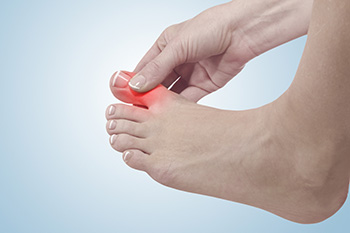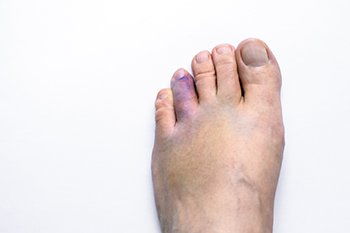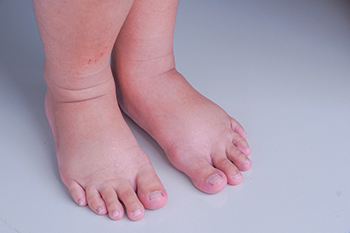Items filtered by date: November 2023
High Heels Can Be Problematic for Women

In the realm of women's fashion, high heels often take center stage. However, this type of shoe can lead to a number of potential foot, toe, and ankle problems. For instance, the classic pump can be a double-edged sword for fashion enthusiasts. The rigid material and elevated height may contribute to the development of a painful knot on the back of the heel, commonly referred to as a pump bump. This not only causes discomfort but can also lead to blisters, swelling, bursitis, and persistent Achilles tendon pain. Ultra-high heels force the feet into a position that places excessive stress on the ball of the foot. This heightened pressure can result in inflammation of the metatarsal and sesamoid bones, as well as the toe bones, potentially leading to hairline fractures. Many high heel shoes have a narrow toe box that can lead to toe problems, like bunions and hammertoe. The risk of ankle sprains is common for those wearing high heels, as the concentration of weight on a small area increases the chances of wobbling and tripping. Prioritizing both style and foot health is not only a wise choice but a necessary one. If you have incurred a foot problem or injury caused by frequently wearing high heels, it is suggested that you make an appointment with a podiatrist who can provide appropriate treatment.
High heels have a history of causing foot and ankle problems. If you have any concerns about your feet or ankles, contact Dr. Odin De Los Reyes from Connecticut. Our doctor can provide the care you need to keep you pain-free and on your feet.
Effects of High Heels on the Feet
High heels are popular shoes among women because of their many styles and societal appeal. Despite this, high heels can still cause many health problems if worn too frequently.
Which Parts of My Body Will Be Affected by High Heels?
- Ankle Joints
- Achilles Tendon – May shorten and stiffen with prolonged wear
- Balls of the Feet
- Knees – Heels cause the knees to bend constantly, creating stress on them
- Back – They decrease the spine’s ability to absorb shock, which may lead to back pain. The vertebrae of the lower back may compress.
What Kinds of Foot Problems Can Develop from Wearing High Heels?
- Corns
- Calluses
- Hammertoe
- Bunions
- Morton’s Neuroma
- Plantar Fasciitis
How Can I Still Wear High Heels and Maintain Foot Health?
If you want to wear high heeled shoes, make sure that you are not wearing them every day, as this will help prevent long term physical problems. Try wearing thicker heels as opposed to stilettos to distribute weight more evenly across the feet. Always make sure you are wearing the proper shoes for the right occasion, such as sneakers for exercising. If you walk to work, try carrying your heels with you and changing into them once you arrive at work. Adding inserts to your heels can help cushion your feet and absorb shock. Full foot inserts or metatarsal pads are available.
If you have any questions please feel free to contact our offices located in Southbury and Farmington, CT . We offer the newest diagnostic and treatment technologies for all your foot and ankle needs.
What Is Gout and Who Is at Risk?

Gout is a form of inflammatory arthritis characterized by sudden, severe attacks of pain, redness, and tenderness in joints, often at the base of the big toe. It is caused by elevated levels of uric acid in the blood, which can form needle-like crystals in a joint, triggering inflammation and intense pain. Risk factors for developing gout can include a diet rich in purines, found in red meat, seafood, and alcohol. Additionally, obesity, and certain health conditions such as high blood pressure, diabetes, and kidney problems may also lead to developing gout. Men and postmenopausal women are more susceptible. If you think you may have gout and you have pain in your big toe, it is suggested that you make an appointment with a podiatrist for an evaluation and treatment that can restore your comfort.
Gout is a foot condition that requires certain treatment and care. If you are seeking treatment, contact Dr. Odin De Los Reyes from Connecticut. Our doctor will treat your foot and ankle needs.
What Is Gout?
Gout is a type of arthritis caused by a buildup of uric acid in the bloodstream. It often develops in the foot, especially the big toe area, although it can manifest in other parts of the body as well. Gout can make walking and standing very painful and is especially common in diabetics and the obese.
People typically get gout because of a poor diet. Genetic predisposition is also a factor. The children of parents who have had gout frequently have a chance of developing it themselves.
Gout can easily be identified by redness and inflammation of the big toe and the surrounding areas of the foot. Other symptoms include extreme fatigue, joint pain, and running high fevers. Sometimes corticosteroid drugs can be prescribed to treat gout, but the best way to combat this disease is to get more exercise and eat a better diet.
If you have any questions please feel free to contact our offices located in Southbury and Farmington, CT . We offer the newest diagnostic and treatment technologies for all your foot and ankle needs.
Broken Toe Symptoms Are Difficult to Dismiss

A broken toe, or toe fracture, is a painful injury when one or more toe bones, known as phalanges, sustain damage. This injury typically results from a sudden impact or trauma, such as stubbing the toe, dropping a heavy object on it, or experiencing a direct blow during sports or accidents. The symptoms of a broken toe are distinct and hard to miss. The most common sign is immediate pain and discomfort, which can range from mild to severe, depending on the extent of the fracture. Additionally, swelling, bruising, and tenderness around the affected area are typical and may worsen over time. The toe may also appear misshapen or out of alignment, making it challenging to move or bear weight. In some cases, you may even hear a cracking or popping sound at the time of the injury. Proper diagnosis and timely treatment are essential for a full and safe recovery. If you have sustained a broken toe, it is strongly suggested that you consult a podiatrist who can accurately diagnose and treat this condition.
Broken toes may cause a lot of pain and should be treated as soon as possible. If you have any concerns about your feet, contact Dr. Odin De Los Reyes from Connecticut. Our doctor will treat your foot and ankle needs.
What Is a Broken Toe?
A broken toe occurs when one or more of the toe bones of the foot are broken after an injury. Injuries such as stubbing your toe or dropping a heavy object on it may cause a toe fracture.
Symptoms of a Broken Toe
- Swelling
- Pain (with/without wearing shoes)
- Stiffness
- Nail Injury
Although the injured toe should be monitored daily, it is especially important to have a podiatrist look at your toe if you have severe symptoms. Some of these symptoms include worsening or new pain that is not relieved with medication, sores, redness, or open wounds near the toe.
If you have any questions, please feel free to contact our offices located in Southbury and Farmington, CT . We offer the newest diagnostic and treatment technologies for all your foot care needs.
Plantar Warts Can Be Treated!
Foods That May Lead To Swollen Feet

Swollen feet can be uncomfortable and concerning, and often, it is not just about wearing the wrong shoes or standing for extended periods. Your diet also plays a significant role in this. Some foods can contribute to fluid retention, leading to swollen feet. Sodium-rich foods, such as processed snacks and canned soups, are notorious culprits. They cause your body to retain water, leading to edema. Sugary foods and beverages can also contribute to this problem, as excessive sugar intake can lead to inflammation and water retention. Additionally, it is essential to watch your alcohol consumption. Alcohol can dehydrate your body, prompting it to retain water when you finally do drink fluids. Furthermore, fried and fatty foods can cause inflammation, impacting circulation and potentially leading to swollen feet. If you have noticed your feet have become swollen, it is suggested that you are under the care of a podiatrist who can guide you toward relief and prevention tactics.
Swollen feet can be a sign of an underlying condition. If you have any concerns, contact Dr. Odin De Los Reyes of Connecticut. Our doctor can provide the care you need to keep you pain-free and on your feet.
Swollen feet are a common ailment among pregnant women and people who stand or sit for extended periods. Aging may increase the possibility of swollen feet and patients who are obese often notice when their feet are swelling too. There may be medical reasons why swollen feet occur:
- Phlebitis - A condition that causes the veins to become inflamed and can also cause leg pain.
- Liver disease - This may lead to low blood levels of albumin which is a protein. This can cause fluid in the blood to pass into the tissues and several areas of the body can become swollen.
- Heart failure - When the heart doesn’t pump properly the blood that is normally pumped back to the heart can pool in the veins of the legs causing swollen feet.
- Kidney disease - One of the main functions of the kidneys is releasing excess fluid in the body. This type of condition can make it difficult for the kidneys to function properly, and as a result the feet may become swollen.
- Deep-vein thrombosis (DVT)- This is a serious condition where blood clots form in the veins of the legs. They can block the return of blood from the legs to the heart which may cause the feet to swell. It is important to be treated by a podiatrist if this condition is present.
Swollen feet can also be caused by bone and tendon conditions, including fractures, arthritis, and tendinitis. Additionally, there may be skin and toenail conditions and an infection may cause the feet to swell. Patients who take medicine to treat high blood pressure may be prone to getting swollen feet.
Many patients elevate their feet to help relieve the swelling and this is generally a temporary remedy. When a podiatrist is consulted the reason behind the swelling can be uncovered and subsequently treated.
If you have any questions please feel free to contact our offices located in Southbury and Farmington, CT . We offer the newest diagnostic tools and technology to treat your foot and ankle needs.

